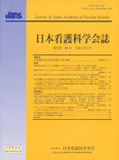Japanese
English
- 販売していません
- Abstract 文献概要
- 参考文献 Reference
- サイト内被引用 Cited by
要旨
目的:長期入院統合失調症患者の家族が,退院を受け入れる心理プロセスを明らかにすることを目的とした.
方法:研究協力者10名を対象に半構成的面接を行い,修正版グラウンデッド・セオリー・アプローチを用いて分析した.
結果:家族が退院を受け入れる心理プロセスから,29の概念と6つのカテゴリーを見出した.受け入れるプロセスは,患者との同居の有無によって差異があった.別居の家族は,家族自身が振り回されないことが退院の決め手となったが,現在は患者の病状改善に対する喜びを感じていた.一方同居の家族は,家族自身の家庭内が落ち着いたことが決め手となったが,現在は病状悪化の不安があり,患者との保てない距離感や付きまとう家族共倒れの心配を抱いていた.
結論:同居の家族は,別居の家族に比べ,より多くの援助を必要としていることが明らかとなった.看護師は,家族の思いを受容し,患者や家族のQOLの向上のために継続的な支援が必要であることが示唆された.
Abstract
Objective: The purpose of this study was to examine the acceptance processes of family members dealing with the discharge of schizophrenia patients from psychiatric hospitals after long-term hospitalization.
Methods: We conducted semi-structured interviews with 10 participants and analyzed the data using a Modified Grounded Theory Approach.
Results: From interview transcripts we extracted 29 concepts and 6 categories related to the acceptance processes of family members dealing with the discharge of schizophrenia patients from hospitals. There were differences based on whether the family lived with or apart from the patient after discharge. For families living apart from the patient, the fact that the family would not be disrupted was an important factor leading to the discharge. However, family members felt happiness in that the patient's condition improved. For families living with the patient, the fact that the family was settled down was an important factor leading to the discharge. However, family members feared the distance between themselves and the patient and the potential breakdown of the family.
Conclusion: We found that families living with discharged patients required more support than families living apart from patients. This indicates that nurses need to be receptive toward family needs and provide continued support to improve patient and family QOL.
Copyright © 2009, Japan Academy of Nursing Science. All rights reserved.


